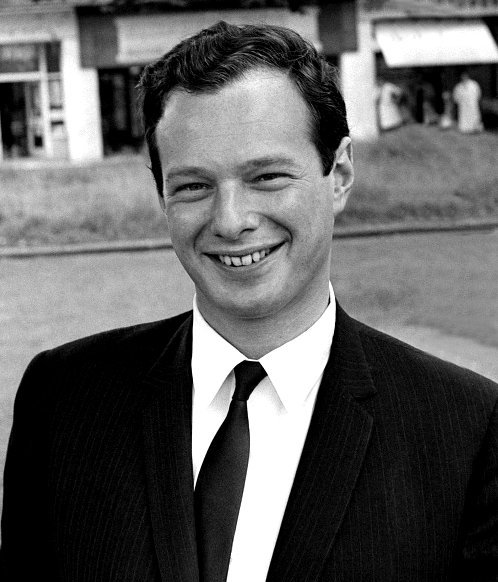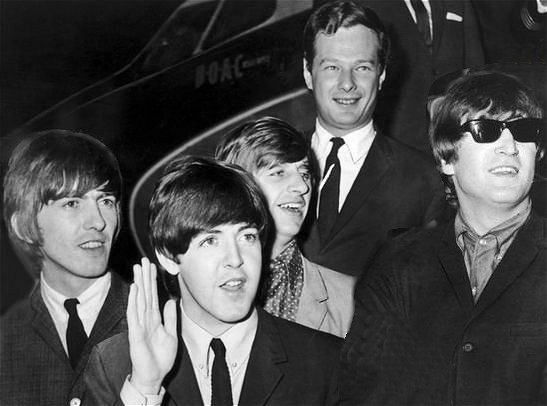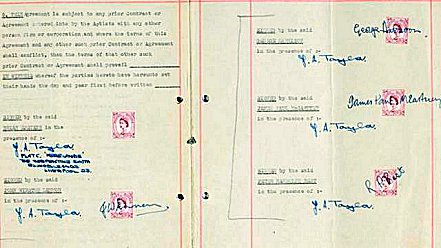Sixties
City presents
a wide-ranging series of
articles on all aspects of the Sixties, penned by the creator of the iconic
60s music paper Mersey
Beat
|
Sixties
City presents
a wide-ranging series of
articles on all aspects of the Sixties, penned by the creator of the iconic
60s music paper Mersey
Beat
|
|||||
|
| The Beatles'
first manager was born at a private nursing home at 4, Rodney Street, Liverpool
on 19th September 1934. His mother was Malka (known as ‘Queenie’), daughter
of a furniture manufacturer in Sheffield, and his father was Harry Epstein,
whose family owned a furniture store in Liverpool. The family moved to Prestatyn
in North Wales for a short time in 1939 at the onset of World War 2 and
then spent three years in Southport where the five year-old boy attended
Southport College. He was also educated at Croxton Preparatory School and,
at the age of ten, he was expelled from Liverpool College for drawing obscene
pictures. He then attended Wellesley School in Aigburth. His parents, however, feeling that there were elements of anti-Semitism in the local schools, sent him to a Jewish boarding school, Beaconsfield School in Sussex. He spent two years there, briefly attended Claysmore, near Taunton, and then Wrekin College. He left Wrekin in the summer of 1950 to begin work at a branch of the family business, I. Epstein & Sons in Walton Road, Liverpool. At the age of 18 he was conscripted for National Service. His first choice was the Royal Air Force, but they rejected him. He began the two-year stint in the Royal Army Service Corps at Aldershot where he was discharged after ten months ostensibly because he was deemed to be emotionally and mentally unfit. For a time he worked at Clarendon Furnishing in Hoylake, a branch of the family firm, where he proved to be successful. Brian had aspirations other than to spend his life working in a family business so, due to his interest in the theatre and a friendship he had established with some actors and actresses appearing at the Playhouse Theatre, he decided he wanted to join RADA (Royal Academy of Dramatic Arts). He then revealed to his family that he was homosexual, shocking his father and younger brother, Clive, but receiving sympathy from Queenie. He was allowed to study at RADA, passing the audition on 18th September 1956, the day before his 22nd birthday. When his father Harry opened a new NEMS store in Great Charlotte Street, he placed Brian in charge of the ground floor record section while Clive ran the electrical and domestic goods department on the first floor. Singer Ann Shelton performed the opening ceremony. The branch proved so successful that Brian was placed in charge of an even larger branch of the store at 12-14 Whitechapel. His friend Peter Brown, from Lewis’s record department, replaced him in the record section at Great Charlotte Street. Singer Anthony Newley was engaged to open the Whitechapel branch.
|
 |
 |
Even after
the initial approach had been made, Epstein found that Parlophone treated
him in a cavalier way and he was often driven to tears of frustration when
George Martin didn’t answer his calls. Eventually, he had to threaten to
boycott EMI labels at his stores. A recording audition was arranged, and
Brian was so convinced that they had passed it that he was to send telegrams
to The Beatles and Bill Harry confirming that they had a recording contract
with Parlophone. Paul sent him a return telegram: ‘WATCH OUT ELVIS’. While
John’s cable read: ‘HOW SOON SHALL WE BE MILLIONAIRES’. George Martin was
to describe the Beatles recording contract as “pretty awful”. There were
no advance payments and they would only receive one penny per single – and
half of that on overseas sales. A 12-track album would be regarded only as six cuts. There were three one-year options with an increase of a quarter of a penny at the end of the first year and an increase of a halfpenny at the end of the second year. John and Paul in particular were simmering with anger for years at the pathetic royalties they received – particularly when they discovered that, after The Rolling Stones had been with Decca for three years, Allen Klein had appeared and renegotiated their contract, obtaining for them an advance of almost £3 million. The Stones were then earning far more from records than The Beatles, even though they were selling in much fewer numbers. Although Brian cultivated the image that he was an astute businessman, his deals in his brief time as a manager didn’t really bear that out. Apart from the far from lucrative record deal, he signed a publishing deal for The Beatles with publisher Dick James which resulted in the group losing control of their own songs for ever. It was rumoured at the time that James’ small independent music-publishing company was in financial trouble. Epstein had been rattled by being asked to wait in the reception area at one of the music-publishing companies he’d intended to negotiate with. Due to the simple fact that James managed to get The Beatles on the TV show ‘Thank Your Lucky Stars’, Epstein decided to sign with him. Arguably, the initial arrangement was fair in relation to music-publishing deals at the time, but Epstein could have arranged his own publishing company and appointed James to administer it. In addition, he could have ensured that the later shares were fairer to John and Paul, whose songs were, after all, what made Northern Songs such a valuable company. Northern Songs was formed in 1963 with James and his partner, Charles Silver, owning 50 per cent of the company. Against the wishes of John and Paul, it became a public company in 1965 with James and Silver owning 23 per cent each while John and Paul had only 15 per cent each. In March 1969 James sold his share to ATV without offering The Beatles a chance to buy them. Brian commissioned journalist Derek Taylor to pen his biography ‘A Cellarful Of Noise’, in which he created the apocryphal story that he’d never heard of The Beatles until a boy came into his store and asked for their record. He also appeared on numerous television and radio shows. In a relatively short time he appeared on ‘Juke Box Jury’, ‘Panorama’, ‘Desert Island Discs’, ‘The Eamonn Andrews Show’, ‘Late Night' after President Kennedy had been assassinated and were able to draw America out of its mourning and put a smile on its face. 'Line-up’, ‘The David Frost Programme’, ‘Tonight’, ‘Celebrity Game', ‘For Art’s Sake’ and ‘Let’s Find Out’. He also compered the American TV show ‘Hullabaloo’. It must be admitted that there was a great deal of incredible luck during his management of The Beatles. The timing was right for a super-group to appear because young people were demanding their own idols for perhaps the first time. He was unable initially to get them a recording contract, and it was only by pure accident that his path led to Parlophone. Luck again intervened when leading American TV host Ed Sullivan was at Heathrow Airport to see The Beatles arrive and booked them on his show. |
| Although
Capitol Records in America had continued to refuse to release Beatles records,
when they eventually decided to, disc jockeys in different parts of America
began playing ‘I Want To Hold Your Hand’. As a result the release date was
moved forward and it became a hit despite Capitol’s initial lack of enthusiasm.
The Beatles also arrived in America a few months later. Towards
the end of Brian’s life there were suicide attempts. He had neglected his
business because of his addiction to drugs and gambling and was virtually
ready to hand his show-business empire over to Robert Stigwood, who had
signed acts such as the Bee Gees and Cream to NEMS Enterprises. Because he was letting his business affairs slip, Brian was neglecting his acts and Cilla Black, Billy J. Kramer and Gerry Marsden all wanted to find new managers. It took all his powers of persuasion to get them to remain with him. His contract with The Beatles was nearing its end and he was worried that they wouldn’t renew it. Without their knowledge, he made a deal with EMI to increase their percentage, but also contracting them to pay NEMS Enterprises royalties for Beatles records for years after his own contract had expired. On Friday 23rd August 1967 Brian planned to spend time at his country home in Kingsley Hill with his friends Geoffrey Ellis and Peter Brown. When he arrived he phoned his mother in Liverpool to tell her that after the weekend he was going to join The Beatles at their Transcendental Meditation studies in Bangor, North Wales, after which he would visit her in Liverpool. During the course of the evening he became restless, due to the fact that a number of other friends he’d invited for the weekend hadn’t arrived, so he drove back to London. On Saturday morning his mother rang Kingsley Hill and spoke to Peter Brown and Geoffrey Ellis, who told her Brian had returned to London. She then rang his Chapel Street home and his butler, Antonio, told her that Brian was still asleep, so she requested that he wasn’t to be disturbed. On Sunday at noon Antonio and his wife, Maria, attempted to contact Brian on the intercom. As there was no reply, they phoned Kingsley Hill, but Brown and Ellis were out, so Antonio got in touch with Brian’s secretary, Joanne Newfield, who arrived with Alistair Taylor. They phoned Peter Brown, who’d returned to Kingsley Hill. He advised them to contact his own doctor, John Gallway, who lived nearby. When the doctor arrived he instructed that the doors to Brian’s room be broken open. His body was found on the bed. The coroner’s verdict was that he had died by an accidental overdose of the drug Carbitol. Brian Epstein was 32 years old at the time of his death. His body was buried at the Jewish Cemetery in Long Lane, Aintree, Liverpool, in Section A, Grave H12. |
 |
|
Article
Text
UK
web hosting by
|